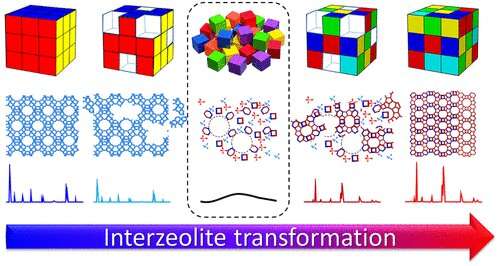New family of catalysts that significantly improves several chemical processes

The University of Alicante Molecular Nanotechnology Lab (NANOMOL) has developed a new family of catalysts with tailor-made properties that can be manufactured with the ideal features for every chemical process. Not only have these catalysts shown considerable improvements in the production of fuels and pharmaceutical intermediates, but their preparation is simpler and more sustainable than current alternatives. Moreover, their characteristics can be modified with great precision to suit the needs of each process.
UA researchers have designed a new material that combines the characteristics of several zeolites, which are extremely useful as catalysts, both natural and artificial, with several applications in the chemical industry. However, one of their major limitations is that they do not allow the conversion of bulky molecules, as their structure consists of very narrow pores. Thanks to the new technology developed by UA researchers, a material with improved technical performance that combines the excellent properties of different zeolites into a single solid can be made possible. To do this, the UA team of the Molecular Nanotechnology Lab has used a process that involves the transformation of zeolites into more stable material. By controlling this conversion, the researchers have managed to combine the characteristics of several zeolites into a single material, which represents a one-of-a-kind advance in this field.
According to University of Alicante Professor of Inorganic Chemistry Javier García, also director of NANOMOL, these new catalysts are an exceptional opportunity to improve chemical processes that involve the transformation of bulky molecules. Moreover, they represent a breakthrough in terms of sustainability of chemical processes, saving energy and natural resources.
Being able to generate catalysts that combine the properties of several zeolites opens up countless opportunities in sectors such as pharmaceuticals, chemicals and plastic reuse, as explained by Noemí Linares, a distinguished researcher at the University of Alicante and member of NANOMOL. These catalysts make it possible, for example, to significantly reduce the temperature required to degrade different plastics, which also means significant savings in energy and CO2emissions. Similarly, catalysts optimized for the synthesis of pharmaceutical compounds can increase the effectiveness of existing catalysts by more than six times. The University of Alicante researchers insist that these results, which have been validated in different processes and with different molecules, show without a doubt the enormous advantages of these new hybrid catalysts.
The discovery has just been patented and has been recently published in the Journal of the American Chemical Society. The UA researchers have already begun talks to market this technology with a large international chemical company.
More information: Monica J. Mendoza-Castro et al, Hierarchical Catalysts Prepared by Interzeolite Transformation, Journal of the American Chemical Society (2022). DOI: 10.1021/jacs.2c00665
Journal information: Journal of the American Chemical Society
Provided by Asociacion RUVID



















